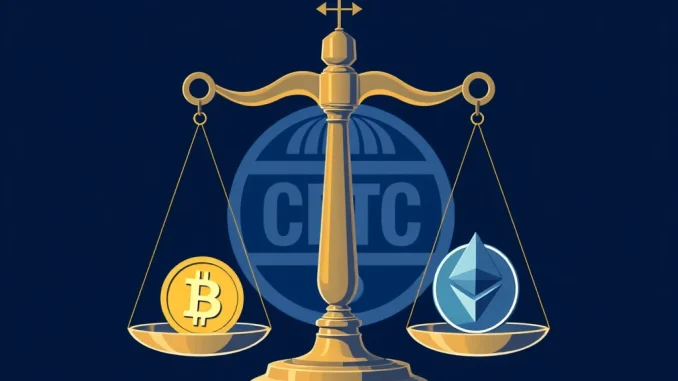
The regulatory landscape for cryptocurrencies in the United States is a topic of constant discussion and significant importance for market participants. Clarity on which agency oversees different aspects of this nascent industry is crucial. A key development emerged regarding the potential expansion of CFTC crypto jurisdiction.
What Did Brian Quintenz Say About Spot Crypto Markets?
Brian Quintenz, who has been nominated to serve as the next chair of the U.S. Commodity Futures Trading Commission (CFTC), has publicly indicated his support for expanding the agency’s authority. According to reports from Crypto in America host Eleanor Terrett on X, Quintenz expressed this view in prepared remarks intended for his upcoming Senate confirmation hearing.
Specifically, Quintenz endorsed the idea of Congress explicitly granting the CFTC jurisdiction over spot crypto commodity markets. This is a significant stance, as the current regulatory framework for spot crypto assets remains somewhat ambiguous, often leading to jurisdictional disputes between the CFTC and the Securities and Exchange Commission (SEC).
Why is Spot Crypto Regulation So Important?
Understanding the distinction between ‘spot’ markets and ‘derivatives’ markets is key here. Derivatives markets involve contracts based on the future price of an asset (like futures or options), while spot markets involve the immediate purchase and sale of the actual asset (like buying Bitcoin directly on an exchange).
The CFTC already has established authority over crypto derivatives that it deems to be based on commodities. However, oversight of the underlying spot crypto markets where these assets are primarily traded by retail and institutional investors has been less clear-cut. This lack of clear oversight can lead to:
- Regulatory uncertainty for businesses and investors.
- Potential gaps in consumer protection against fraud and manipulation.
- Challenges for market integrity.
Bringing these spot markets under a clear regulatory umbrella is seen by many as a necessary step for the maturation and broader adoption of cryptocurrencies in the U.S.
CFTC vs. SEC: The Ongoing Debate Over Crypto Regulation
The question of whether a particular crypto asset is a ‘commodity’ or a ‘security’ has been at the heart of the U.S. regulatory debate. The SEC typically regulates securities, while the CFTC regulates commodities and derivatives markets. Many prominent cryptocurrencies, like Bitcoin and Ethereum, have been referred to as commodities by regulators, including past and present CFTC officials.
Granting the CFTC explicit jurisdiction over spot crypto commodities would provide a dedicated regulator focused on commodity markets to oversee a significant portion of the crypto ecosystem. This could potentially streamline regulatory processes and provide more tailored rules compared to applying securities laws designed for traditional assets.
What Does This Mean for US Crypto Policy?
Brian Quintenz’s endorsement signals a potential shift or, at least, a reinforcement of the view within regulatory circles that the CFTC is the appropriate body to oversee spot crypto commodity trading. His confirmation hearing is scheduled for June 10 at 19:00 UTC, where he is expected to elaborate on his views and answer questions from senators.
This development aligns with calls from various industry participants and some lawmakers for Congress to provide legislative clarity on crypto regulation. Explicit legislation granting jurisdiction to either the CFTC or SEC (or defining clear boundaries) is widely seen as the most effective way to end the current state of regulatory ambiguity.
If confirmed, Quintenz’s leadership at the CFTC could prioritize pursuing this expanded jurisdiction, either through working with Congress on new legislation or potentially asserting existing authority where possible. This could significantly shape the future of US crypto policy.
Looking Ahead: Challenges and Opportunities
While gaining CFTC oversight could offer benefits like increased market integrity and investor confidence, challenges remain. Defining the scope of ‘crypto commodities’ versus ‘crypto securities’ would still require careful consideration and potential coordination with the SEC. Implementing effective oversight mechanisms for decentralized markets also presents unique technical and logistical hurdles.
However, clear regulation under an agency familiar with commodity markets could unlock new opportunities for institutional participation and innovation within a well-defined legal framework.
Conclusion: A Step Towards Regulatory Clarity?
Brian Quintenz’s support for CFTC crypto jurisdiction over spot crypto markets is a notable development in the ongoing effort to establish clear crypto regulation in the United States. His stance, shared ahead of his confirmation hearing, highlights the growing consensus among some policymakers that legislative action is needed to define regulatory roles. As the debate continues, all eyes will be on Congress and regulatory bodies like the CFTC and SEC to provide the clarity necessary for the crypto industry to thrive responsibly.



